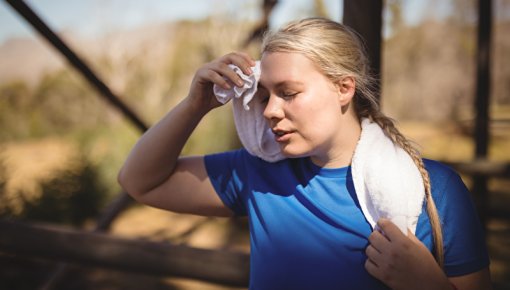Akdeniz M, Boeing H, Müller-Werdan U et al. Effect of Fluid Intake on Hydration Status and Skin Barrier Characteristics in Geriatric Patients: An Explorative Study. Skin Pharmacol Physiol 2018; 31(3): 155-162.
Barreto Annes LM, Andrade R, Pontes IEA et al. Subcutaneous Versus Intravenous Rehydration in Hospitalized Older Adults: A Meta-Analysis. J Infus Nurs 2020; 43(5): 283-291.
Bhanu C, Avgerinou C, Kharicha K et al. 'I've never drunk very much water and I still don't, and I see no reason to do so': a qualitative study of the views of community-dwelling older people and carers on hydration in later life. Age Ageing 2019; 49(1): 111-118.
Braun J, Müller-Wieland D. Basislehrbuch Innere Medizin. Munich: Urban und Fischer; 2018.
Broadhurst D, Cooke M, Sriram D et al. Subcutaneous hydration and medications infusions (effectiveness, safety, acceptability): A systematic review of systematic reviews. PLoS One 2020; 15(8): e0237572.
Bruno C, Collier A, Holyday M et al. Interventions to Improve Hydration in Older Adults: A Systematic Review and Meta-Analysis. Nutrients 2021; 13(10).
Danielsen MB, Andersen S, Worthington E et al. Harms and Benefits of Subcutaneous Hydration in Older Patients: Systematic Review and Meta-Analysis. J Am Geriatr Soc 2020; 68(12): 2937-2946.
Deutsche Gesellschaft für Anästhesiologie und Intensivmedizin (DGAI). Intravasale Volumentherapie beim Erwachsenen (S3-Leitlinie). AWMF-Registerno.: 001-020. 2020.
Deutsche Gesellschaft für Ernährung (DGE), Österreichische Gesellschaft für Ernährung (ÖGE), Schweizerische Gesellschaft für Ernährungsforschung (SGE). Referenzwerte für die Nährstoffzufuhr. Bonn: DGE; 2017.
Deutsche Interdisziplinäre Vereinigung für Intensiv- und Notfallmedizin (DIVI). S2k-Leitlinie Intravenöse Infusionstherapie bei akut kranken Kindern jenseits der Neugeborenenperiode. AWMF-Registerno.: 040-016. 2022.
Edmonds CJ, Foglia E, Booth P et al. Dehydration in older people: A systematic review of the effects of dehydration on health outcomes, healthcare costs and cognitive performance. Arch Gerontol Geriatr 2021; 95: 104380.
Falszewska A, Szajewska H, Dziechciarz P. Diagnostic accuracy of three clinical dehydration scales: a systematic review. Arch Dis Child 2018; 103(4): 383-388.
Fischer T, Grab D, Grubert T et al. Maternale Erkrankungen in der Schwangerschaft. Facharztwissen Geburtsmedizin 2016: 347–618.
Flynn E, Smith CH, Walsh CD et al. Modifying the consistency of food and fluids for swallowing difficulties in dementia. Cochrane Database Syst Rev 2018; (9): CD011077.
Gesellschaft für pädiatrische Gastroenterologie und Ernährung (GPGE). S2k-Leitlinie Akute infektiöse Gastroenteritis im Säuglings-, Kindes- und Jugendalter. AWMF-Registerno.: 068-003. 2019.
Goehring MT, Farran J, Ingles-Laughlin C et al. Measures of Skin Turgor in Humans: A Systematic Review of the Literature. Wound Manag Prev 2022; 68(4): 14-24.
Hartling L, Bellemare S, Wiebe N et al. Oral versus intravenous rehydration for treating dehydration due to gastroenteritis in children. Cochrane Database Syst Rev 2006; (3): CD004390.
Herke M, Fink A, Langer G et al. Environmental and behavioural modifications for improving food and fluid intake in people with dementia. Cochrane Database Syst Rev 2018; (7): CD011542.
Herold G. Innere Medizin. Cologne: Herold; 2021.
Hooper L, Abdelhamid A, Ajabnoor SM et al. Effects of fluid and drinking on pneumonia mortality in older adults: A systematic review and meta-analysis. Clin Nutr ESPEN 2022; 47: 96-105.
Hooper L, Abdelhamid A, Attreed NJ et al. Clinical symptoms, signs and tests for identification of impending and current water-loss dehydration in older people. Cochrane Database Syst Rev 2015; (4): CD009647.
Katz B, Airaghi K, Davy B. Does Hydration Status Influence Executive Function? A Systematic Review. J Acad Nutr Diet 2021; 121(7): 1284-1305.
Kostelnik SB, Davy KP, Hedrick VE et al. The Validity of Urine Color as a Hydration Biomarker within the General Adult Population and Athletes: A Systematic Review. J Am Coll Nutr 2021; 40(2): 172-179.
Masot O, Miranda J, Santamaría AL et al. Fluid Intake Recommendation Considering the Physiological Adaptations of Adults Over 65 Years: A Critical Review. Nutrients 2020; 12(11): 3383.
Maughan RJ, Shirreffs SM. Muscle Cramping During Exercise: Causes, Solutions, and Questions Remaining. Sports Med 2019; 49(Suppl 2): 115-124.
Popkin BM, D'Anci KE, Rosenberg IH. Water, hydration, and health. Nutr Rev 2010; 68(8): 439-458.
Prisco A, Capalbo D, Guarino S et al. How to interpret symptoms, signs and investigations of dehydration in children with gastroenteritis. Arch Dis Child Educ Pract Ed 2021; 106(2): 114-119.
Pschyrembel Online. 2023.
Volkert D, Beck AM, Cederholm T et al. ESPEN guideline on clinical nutrition and hydration in geriatrics. Clin Nutr 2019; 38(1): 10-47.
Volkert D, Beck AM, Cederholm T et al. ESPEN practical guideline: Clinical nutrition and hydration in geriatrics. Clin Nutr 2022; 41(4): 958-989.
Watson P, Whale A, Mears SA et al. Mild hypohydration increases the frequency of driver errors during a prolonged, monotonous driving task. Physiol Behav 2015; 147: 313-318.
IQWiG health information is written with the aim of helping people understand the advantages and disadvantages of the main treatment options and health care services.
Because IQWiG is a German institute, some of the information provided here is specific to the German health care system. The suitability of any of the described options in an individual case can be determined by talking to a doctor. informedhealth.org can provide support for talks with doctors and other medical professionals, but cannot replace them. We do not offer individual consultations.
Our information is based on the results of good-quality studies. It is written by a team of health care professionals, scientists and editors, and reviewed by external experts. You can find a detailed description of how our health information is produced and updated in our methods.

